The Expanse: A Telltale Series Review
Filling a void with emptiness
It is hard to accept when a TV series is cancelled, especially one that is so well received. The Expanse released six seasons from 2015 to 2022 before it was cancelled for a second time. SyFy originally ended the show’s run after season three, before Amazon picked it up for another three shorter seasons, finishing it in anticlimactic fashion. The show is based on the popular sci-fi novels by James S. A. Corey, and while the books have another three or more seasons worth of content to bring to TV, there is currently no indication that it will be resurrected again. But that does not mean the series has no future in visual media. Deck Nine Games and Telltale saw an opportunity to bring the franchise to gamers with their narrative style. Rather than charging ahead, The Expanse: A Telltale Series takes place before the first season of the TV show. The five-episode adventure focuses on Camina Drummer, a fan-favorite that initially appeared in season two as a minor character. While it is fantastic to see Cara Gee reprise her role, it is a shame it was not under better circumstances.
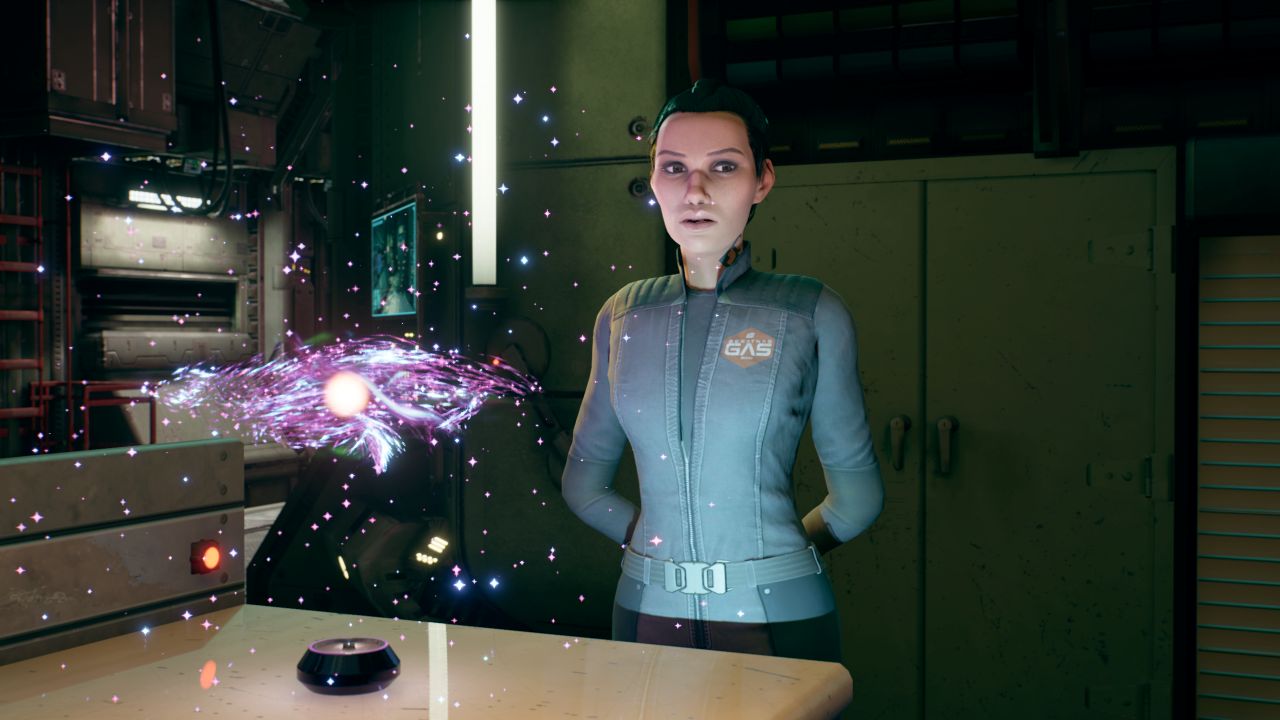
The game begins with Camina Drummer as the XO (second in command) of the spaceship Artemis, a salvaging vessel in search of a big payday within our Solar System. The ship, with its crew of seven humans, is heading for spaceship wreckage to find a clue that, according to the Captain, will lead to something highly valuable. Unfortunately a group of ruthless pirates are looking for the same thing and are prepared to kill for it. Drummer will explore spaceship debris, salvage what she can, supervise her crew, avoid pirates, and follow the trail of clues that leads to a bizarre derelict space station. But when the treasure turns out to be something unexpected, Drummer might have to change tactics.
Although the story has a decent outline, it fails to captivate. There are not enough diverse locations to keep things moving. Action sequences are infrequent and bland. Even in the few dramatic scenarios, like being chased by pirates or hanging off the Artemis as it accelerates, the stakes are low because we know Drummer survives. There is not much suspense and the few jokes it has are rarely funny. And while pirates are the main background threat, most conflict actually comes from Drummer’s irritating crew members.
Cara Gee lends her voice to Drummer and plays her as well as in the TV series. It is great to see her again under different circumstances. For those unfamiliar with the show, Drummer is a no-nonsense, badass, stubborn, and loyal character who has a strange accent because she was born in the asteroid belt. She has natural leadership qualities and is highly pragmatic, with a strong moral compass and the desire to fight for her people. The biggest difference between the show and the game is the sheer amount of dialogue. As the main character, she has more lines across these five episodes than in the entire TV series. While still a highly likable personality, her character is diluted with so much talking. It is no longer a case of hanging on her every word, because much of what she says is there to fill a void that did not need filling.
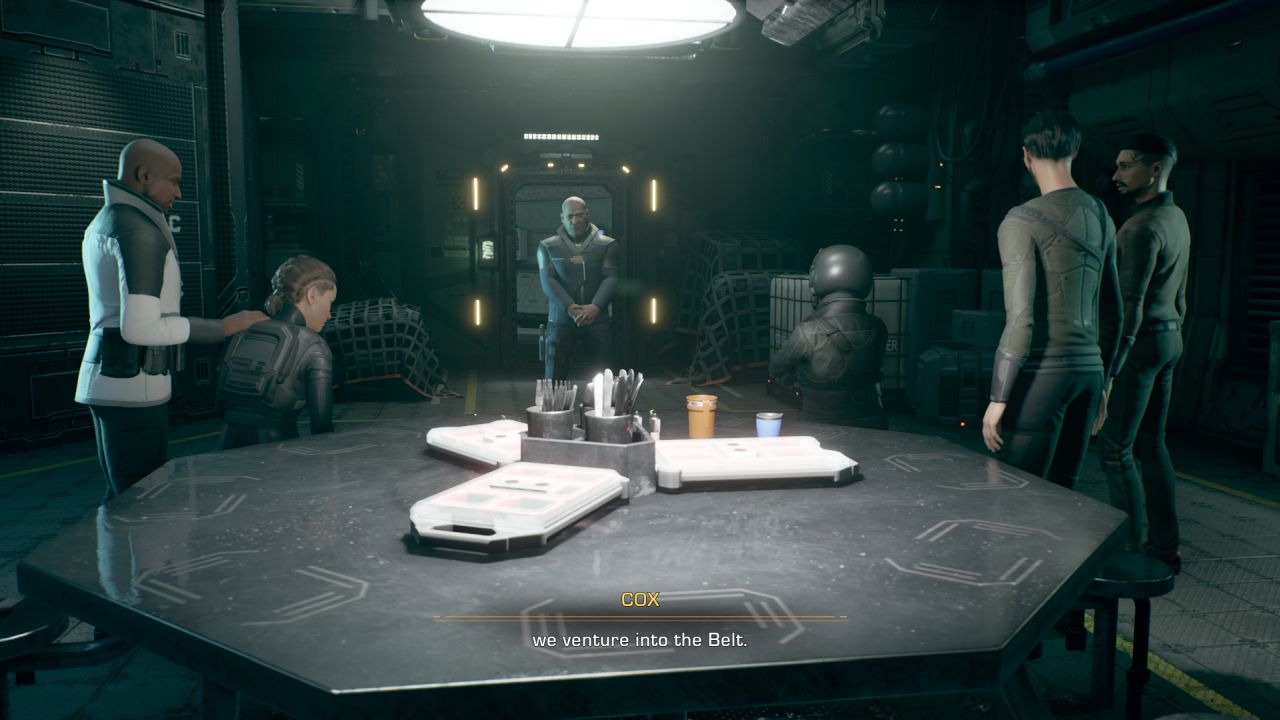
The other crew members on the Artemis are terribly disappointing bunkmates. Nearly all six are unlikable, underdeveloped, or uninteresting, and sometimes all three combined. The lying and duplicitous Captain quickly loses respect, and fortunately he barely plays a role beyond the first episode. The ship’s older pilot is insubordinate and grumpy, but at least she has a basic character arc. The twins, with accents similar to Drummer, are childish and crass, and it took an effort to remember which was which. Even the ship’s doctor is so bland that you might forget he exists, much like the game does itself in the middle episodes. Players can optionally talk to the crew during downtime, like in Telltale’s Guardians of the Galaxy adaption, but the juice is not worth the squeeze.
The ship’s engineer, Maya Castillo, is too different from the others. She is aggressively affectionate towards Drummer and a forceful love interest. Maya is unreasonably nice, illogically helpful, and practically fawns over Drummer. You cannot rebuke most of her advances and must go along for the ride. Even when there is the option to avoid an intimate moment, Maya acts much the same afterwards. The relationship is so flagrant that it is like stepping into the teenage drama of Life is Strange: Before the Storm. Some players might assume she’s the major antagonist, pretending to be nice, but an evil Maya sadly does not eventuate. Alongside a more balanced group, Maya might not have contrasted so badly like she does against the dark abyss that is the Artemis crew.
Like Telltale’s previous games, there is loads of dialogue across the five episodes. Most of it comes out in the animated cutscenes that play out too much like a TV show and not enough like a narrative game. Quick-time events are unusually rare and easy, but that is not a bad thing. There are surprisingly few dialogue choices and it is not atypical to sit for minutes without needing to press a button or select a reply. Even when dialogue choices crop up, there are usually only two responses that are similar. Additional crew dialogue becomes available if you find salvage during the open gameplay segments. And while this is not a bad idea in theory, it amounts to nothing substantial and players who are less thorough get penalized with fewer dialogue branches.
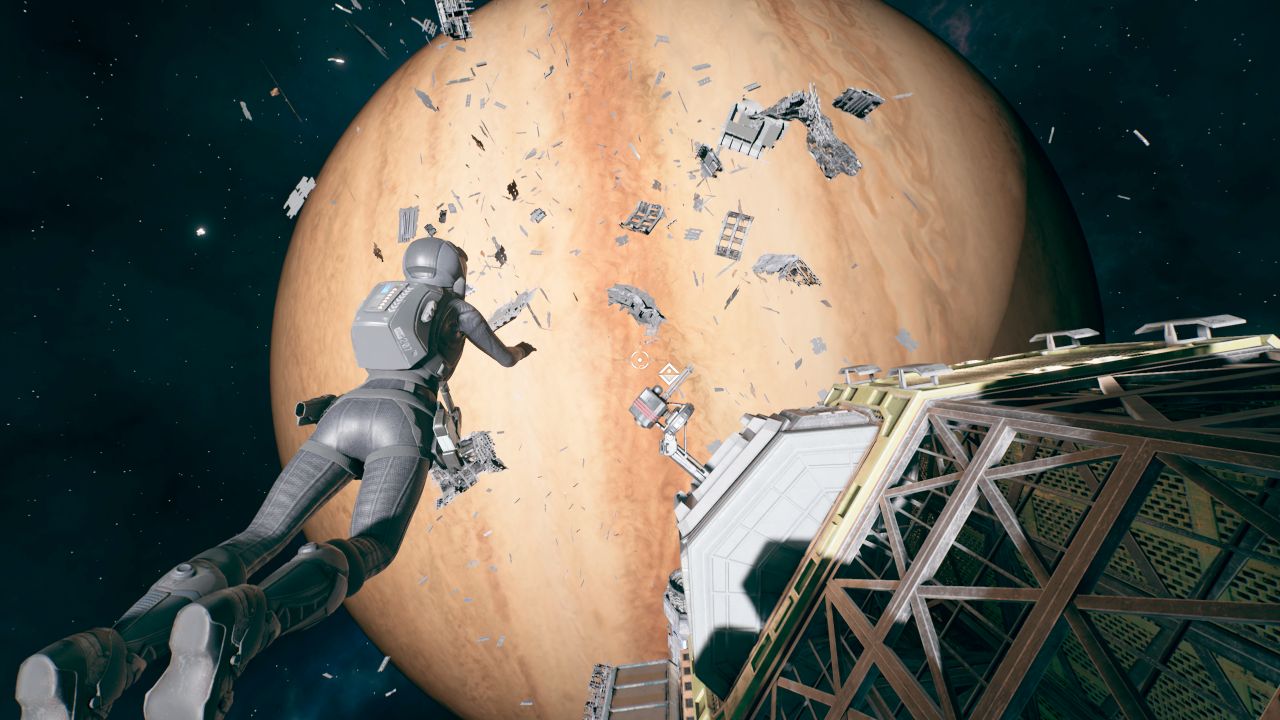
Outside cutscenes, the gameplay is repetitive and dull. Players can take control of Drummer in third-person to stroll about the Artemis’ hallways to find crewmates—incidentally, the ship’s interior seems terribly inefficient. In the first two episodes, players use thrusters to freely glide through the cold void of space around ship debris. It is initially neat to fly about and walk on inverted metal surfaces with magnetic boots, but it gets boring quickly and is slightly disorientating. The third and fourth episodes require similar movement in the dreary confines of an abandoned space station. This is also when the game twists geometry via a tiresome oxygen-deprived hallucination. Most gameplay sections have the same dull tasks for players. Identical square bulkhead panels are cut open for salvage. Dumb hostile drones with red lasers must be avoided. And power nodes have to be daisy-chained together. Telltale’s games are often criticized for their lack of gameplay, but so much of the exploration is a waste of time.
Many spots in the navigable environments have optional prompts that flesh out the story. Narrative logs, sensor readings, radio messages, and mission notes are seldom interesting. Some interactive points let you radio a crew member or begin an internal monologue, which is typically encouraged in these games. But, during a replay, it was more pleasant to avoid such interactions. This could be because the crew members are so terrible or because the interactive prompts are rarely succinct. If you click to chat, prepare to wait for whoever it is to finish yapping before you can interact with anything else.
Perplexingly, the game is both short and slow. At less than six hours long, it is one of the shortest narrative adventures of its kind. Most episodes have no meat on their bones, taking just over an hour to complete without substantial narrative arcs. The finale is well paced, with barely any exploration, but is only half an hour long. Given the content and structure, the five episodes should have been split into two or three instead. And yet, even with its short runtime, the game feels slower than a snail under the influence of nine g-forces. There is heaps of unnecessary padding in glacial cutscenes, reminiscent of Life is Strange 2. So much could have been replaced with a simple voice over while players walked or floated to their next objective. Since dialogue cannot be skipped, replaying the adventure is like trying to breathe in a vacuum, but it is the only way to alter narrative choices and save any of the ill-fated crew members.
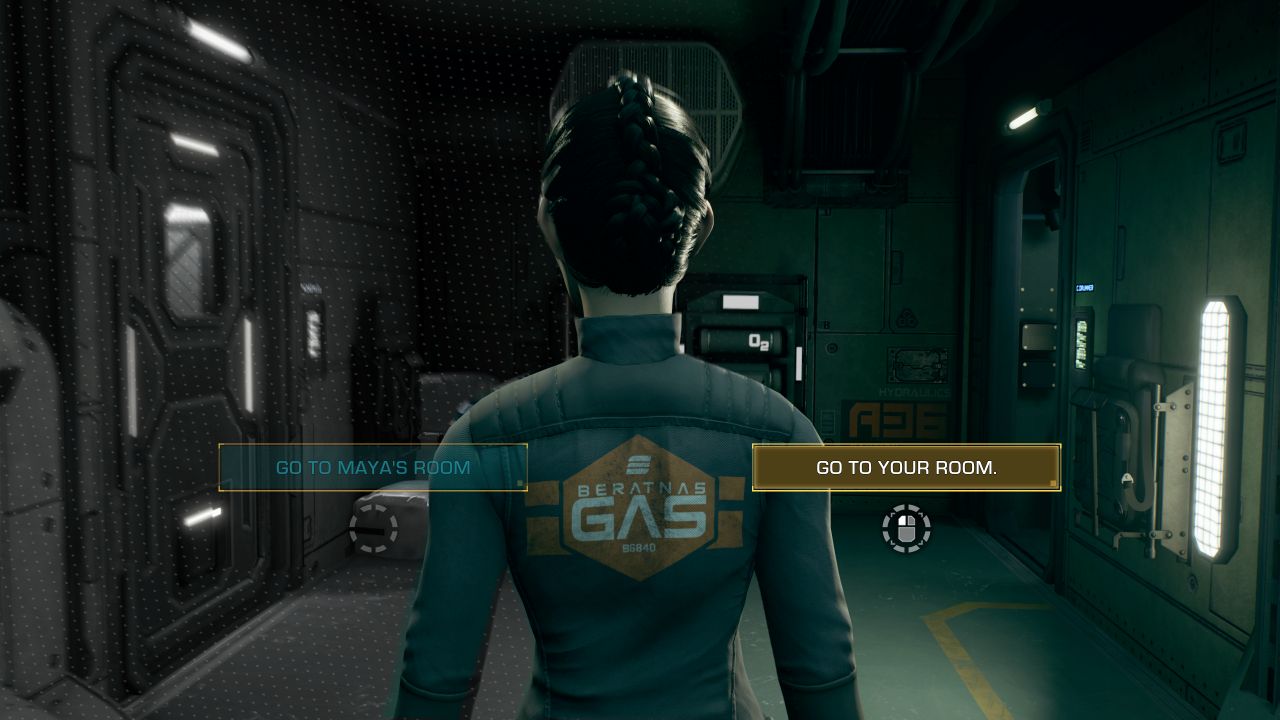
Choice and consequence tries its best to salvage the story. Some big choices do not alter proceedings much, and a few are comically ignored. Like when you choose to fight back while at gunpoint, shooting a foe in both shoulders; somehow that foe recovers to not only hold a weapon in one hand but also restrain a hostage in the other. Most permutations eventuate in the finale and choices dictate which characters live or die. Interestingly, crew deaths are often the result of direct actions by Drummer, and this almost explains why they were made so obnoxious in the first place. But, since the main events remain unchanged, it is not a series of branching paths and more like a linear road with optional puddles of blood to splash through.
At least it is a decent looking game, despite a few visual shortcomings. Characters are more like caricatures, which was probably done so the visuals age better. This looks fine for Drummer and most others, but the Captain, pirate leader, and doctor look incredibly strange. The environments are often fairly plain, partly due to sticking to the TV show’s visual design. Ship interiors are okay, but not crammed with detail and some textures are mediocre. Fortunately the space battles involving pirates look like they were taken straight out of the show. And the voice work is great, helped by some quality lip-syncing and facial animations. There are even good cameos from actors that had pivotal roles in the TV series, to remind players of better times.
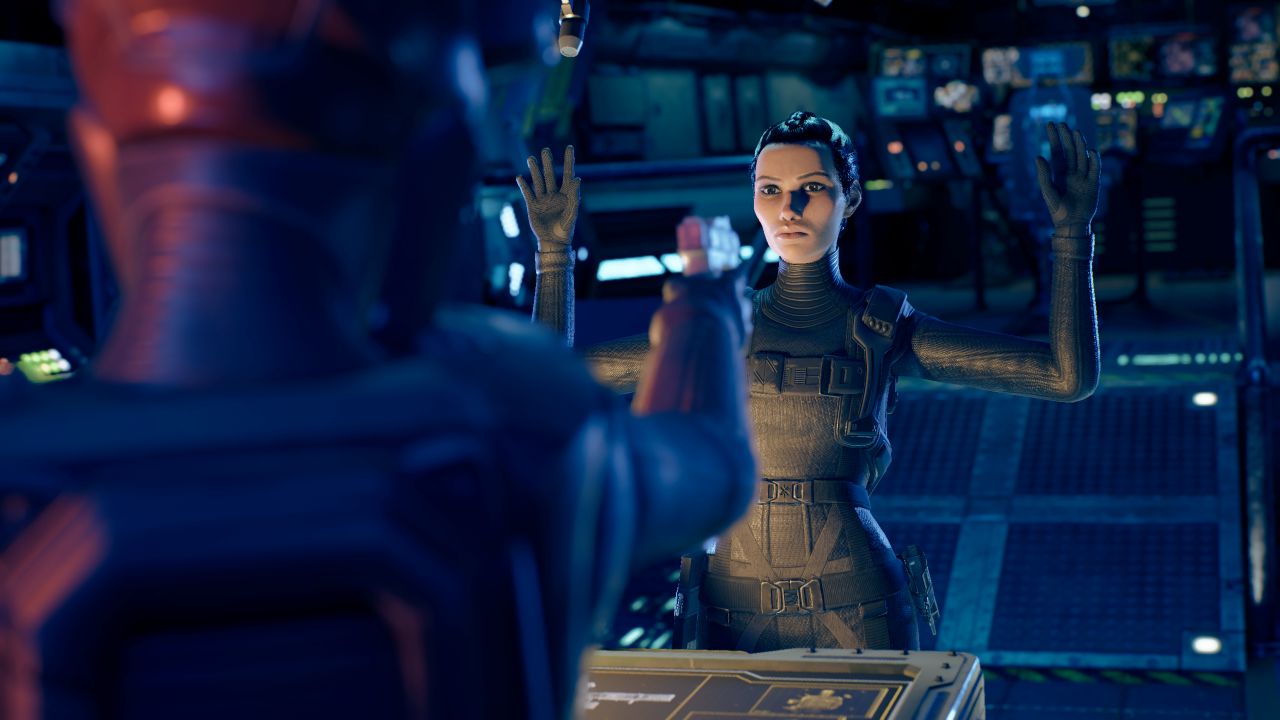
The Expanse: A Telltale Series is far from the best adventure from either Deck Nine Games or Telltale. Its five episodes are slow and brutally short, averaging just over an hour long, with an insubstantial narrative and boring scenarios. It has a small cast of unlikable characters, and one abnormally friendly love interest that belongs in another universe. Gameplay is repetitive with dull interactions and awfully similar tasks. Different choices can lead to character deaths but some are ineffectual. Even the wonderful casting of Cara Gee as the excellent Drummer cannot save this decent looking prequel from getting lost in space.
 Comments
Comments
















